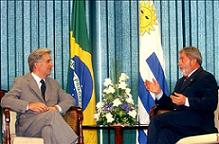Brazil, Uruguay to address strained ties
 Brazil's president traveled to neighboring Uruguay on Monday to smooth over strained economic ties rooted in the smaller nation's discontent over relations with the fractured Mercosur trade bloc.
Brazil's president traveled to neighboring Uruguay on Monday to smooth over strained economic ties rooted in the smaller nation's discontent over relations with the fractured Mercosur trade bloc.
Luiz Inacio Lula da Silva was expected to offer Uruguayan President Tabare Vazquez funding for infrastructure and energy projects and other incentives aimed at preventing Uruguay from seeking a more open trade relationship with the United States.
Both Brazil and Uruguay are members of the five-nation Mercosur trade bloc, but Uruguay and Paraguay have complained for years that their interests take a back seat to those of Argentina and Brazil -- South America's two largest economies.
Silva's visit is also viewed by the Brazilian media as a way to head off any attempt by the United States to establish a trade agreement with Uruguay. U.S. President George W. Bush will meet with Vazquez in Uruguay next month as part of a Latin American tour that also includes a stop in Brazil.
Uruguay and the United States last month signed a pact laying down guidelines for boosting trade between the two countries, a move Uruguayan officials said is key to the small South American nation's future economic growth.
The Trade Investment Framework Agreement calls for a bilateral group on investments and commerce to meet at least once a year to identify areas of future trade liberalization.
The Southern Cone Common Market, or Mercosur, unites some 250 million people with a gross domestic product of US$1 trillion (euro760 billion), or about 76 percent of the total for South America.
Made up of Brazil, Argentina, Paraguay, Uruguay and Venezuela, the trade bloc has long suffered from internal bickering over matters as mundane as trade in pork and appliances. Bolivia, Chile, Colombia, Ecuador and Peru are associated members, and Bolivia is seeking full membership.
Mercosur leaders met in January in an attempt to revitalize the bloc and boost its goal of regional integration, but the summit was overshadowed by disagreements among the presidents.
While the Brazilian hosts declared the meeting a success for attracting leaders from outside the bloc -- 11 of the continent's 12 presidents attended -- the nonmembers mostly served to heighten the confusion.
Bolivian President Evo Morales criticized Brazil for paying too little for Bolivian natural gas, and attacked Colombia for accepting anti-drug aid from the United States, generating a stern response from Colombian President Alvaro Uribe.
The leaders of Paraguay and Uruguay -- Mercosur's smallest economies -- chafed at what they said was a patronizing attitude on the part of Argentina and Brazil, even though one of the few concrete measures to emerge from the meeting included US$50 million (euro38.07 million) in loans to help them boost their economies.
Silva, however, pointed out that trade among the Mercosur nations has grown to US$30 billion (euro22.84 billion) in 2006 from US$4 billion (euro3.05 billion) in 1990, the year before the bloc was formed.
(Published by BusinessWeek, February 26, 2007)